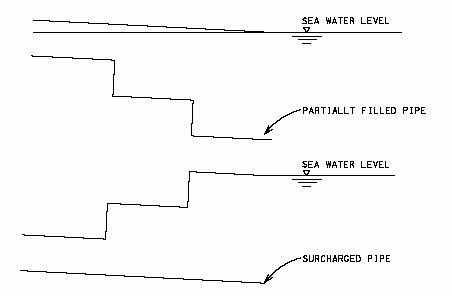Chapter: Drainage Works Civel engineering engineer doubt problem guide and intrview questions and answer
Why is it preferable to design stormwater drains to match soffit?

Why
is it preferable to design stormwater drains to match soffit?
Stormwater
drains collect stormwater in their corresponding catchment areas during
rainstorm and convey the collected water through outlets to the sea. Therefore,
in considering the hydraulic design of stormwater drains, other than normal
drainage pipe capacity to be taken into consideration, one should check the
backwater effect due to tidal condition at outlets if the drains are located
quite close to the downstream end of outlets.
Stormwater
drains are normally designed to match soffit to avoid surcharging by backwater
effect or when the downstream pipes are running full. Normally pipe size increases
from upstream to downstream. For the case of matching drain invert, when outlet
pipes are fully surcharged by tidal effect of the sea or when the downstream
pipes are fully filled with stormwater, pipe sections immediately upstream of
the outlet are also surcharged too. However, for the case of matching pipe
soffit, the immediate upstream sections of outlet pipes are not totally
surcharged even though downstream pipes are running full. However, it is not
always practical to maintain soffit for all pipelines because it requires
sufficient drop to achieve this.
Moreover,
the flow of stormwater is mainly by gravity in the design of stormwater drains.
In case the drains are designed to match invert, then it stands a high
probability that the flow in the upstream smaller pipes has to be discharged
against a head.
Note: Matching soffit means that all pipelines are aligned continuously
with respect to the pipelines' crown level.

Related Topics